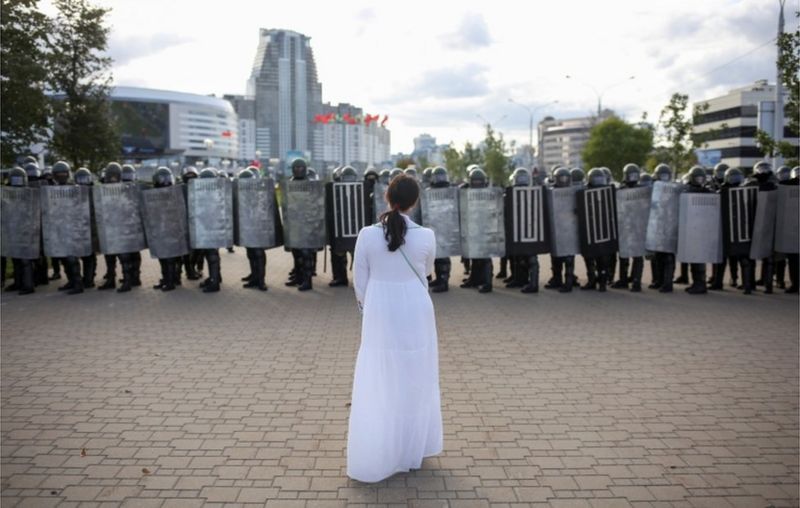What are the qualities that make protest effective?
How many people need to take to the streets in order to oust a political leader?
As we know country wide protest can cause tremendous political change. Take for example Zine al-Abidine Ben Ali and the beginning of the Arab Spring where countries across Northern Africa and the Middle East overthrew oppressive governments. For an example we might understand better, look at South Africa and the anti-apartheid movements that we are emulating in class. Historically these are successful protests that actually inspired great change in their regions.
Some of the most recent political demonstrations are from Belarus (pictured here)2
Tens of thousands of Belarusians are marching in response to a disputed election. Police have been arresting non-violent protestors and subjecting them heavy surveillance, sudden detention and torture. The question of whether or not this protest will succeed can be illuminated by the insight of Professor Erica Chenoweth, Professor of Political Science at Harvard University.
Chenoweth first take time to differentiate between forms of protest by first dividing them into forms of violent and non-violent protest. Violent protests would include assassination or rioting whereas non-violent protests can take many forms like: boycotts, strikes, demonstrations, ect. In fact Prof. Chenoweth cites 198 diffrent forms of non-violent protest from her research. And nonviolent forms of protest are also more effective than violent protest because people are more likely to commit to non-violent protest for a variety of reasons like a low risk or injury among others. Because non-violence has a lower risk it is more likely to draw on more groups of people, often involving women, children, the elderly and the disabled. The Professor ways that it only takes on average 3.5% of a country's population to launch a successful protest. Chenoweth's latest research has shown that the rate of armed insurrection and violent protest is on the decline whereas the rate at which non-violent forms of protest are being used is increasing. A much more disturbing statistic is that 9/10 protest movements of these sorts fail.
Chenoweth's argument seems reasonable, if great change can only be achieved by the masses, then making it more inviting for the masses to take to the streets would in turn garner more support for that protest. Violence on the side of protestor seems to alienate all those other groups who may have joined should the protest have been peaceful. The lesson of this thought seems to be firstly; that those who take up violence only serve to alienate themselves from the rest of their base, and secondly, that non-violent protest is the most effective way to gain public support.
Questions for the Reader:
- Professor Chenoweth says that it takes 3.5% of the population of a country to be in protest of the leadership to oust a political leader. What do you make of this?
- What would you define as "violent" protest? Are attacks on property violent? What about verbal abuse that doesn't involve a physical confrontation?
Sources:
1. Edmonds, D. (2020, September 19). How many people does it take to oust a political leader? Retrieved September 23, 2020, from https://www.bbc.com/news/stories-54142487
2. Koltsova, O. (2019, October 12). Why the tech scene in Belarus is growing. Retrieved September 23, 2020, from https://innovationorigins.com/why-the-tech-scene-in-belarus-is-growing/




1 comment:
Very cool article! A question I never knew I wanted to know the answer to. I wonder when measuring the success of protest- what is constituted as change? Does change need to be regarding legislature?I think back on the recent Black Lives Matter protests and although some cities saw significant reform to their police departments, I would argue that most of change was cultural and I think these protests not only challenged norms in how people view and treat each other, but also changed how people mobilize to challenge an issue.
Post a Comment